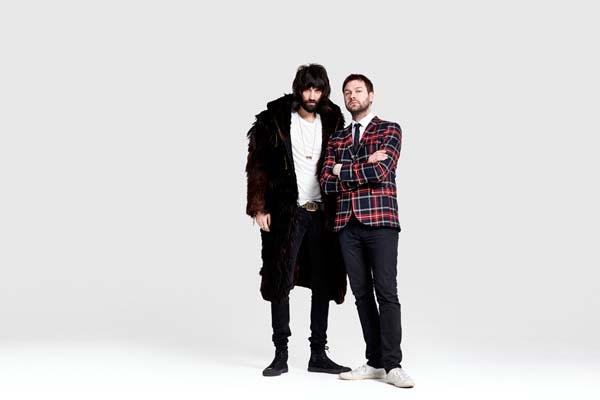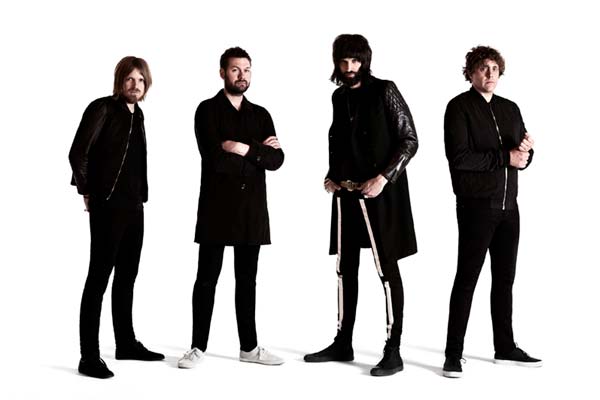The media tends to project a simplified image of Kasabian as a group of lairy hedonists with a messiah complex.
This conception isn't unfounded, but the discussion wouldn't linger if the band's creative output weren't capable of sustaining interest. “I don't care about any of the success, money, fame — all that nonsense,” declares guitarist and creative leader Serge Pizzorno. “The only thing I care about is the making of stuff. That's why I get up every morning buzzing to get into the studio.”
Last month Kasabian released their fifth LP, ‘48:13’. In the lead-up to the record's release, UK publications like ShortList and The Guardian again drew attention to the Leicester lads' bravado-laden self-appraisal. Indeed, during our conversation, Pizzorno doesn't shy away from statements elevating the group's significance.
However, it becomes apparent that this estimation stems from his fierce determination, which goes hand-in-hand with the compulsive creative tendency. “We have this element that makes us unique — [we're] trying to push rock music forward, make new rock music. I so love the late '60s. I love all the music that was created there — the avant-garde stuff like Silver Apples and obviously the Stones and The Who and all that stuff. We know what they used to sound like and we know how amazing that was, but let's figure out what they would sound like if they were making music now.”
What's particularly striking about Pizzorno's immodest statements of intent is the sober manner with which they're conveyed. He gives off the impression of merely rummaging through facts, rather than trying to prove a point. Then again, perhaps the songwriter's considered disposition shouldn't come as a surprise.
“Rock music’s fallen behind - definitely [behind] hip hop and electronic music - because it’s just not moved on. So we’re trying to move it on, to make the new rock & roll.”
It's his loutish sideman, vocalist Tom Meighan, who's the more outspoken member of Kasabian. Pizzorno, on the other hand, is the thinker, the man committed to an artistic agenda. “I've always loved exploring,” he says. “That's why on each record I sort of go off. I get bored. If a formula's working, artistically it doesn't do anything for me. I love just trying things and moving around.”
Nevertheless, he's also in tune with the critical task of making music with popular accessibility. “What's amazing about our band is we bring loads of people together from all walks of life, from all angles. There's a huge part of me that's like, 'Let's go so experimental and so insane and blow people's minds', but then you'd lose a lot of that element of what we are. When you listen carefully there's a lot of avant-garde, there's a lot of experimentation going on, but there's also a great hook or great melody that people can connect to and relate to. And that's amazing. I've realised over time that that's what makes us unique.”
Pizzorno isn't the type of songwriter who commences work on an album purely for the sake of it. Before immersing himself in the gruelling process he needs to decipher the chief creative objective. For ‘48:13’, reaching an understanding of what constitutes Kasabian's essential appeal had a major influence on the record's framework. “[Albums] always start with a kind of vision, where you're like, 'Right, this is where my head's at, this is where I want to explore’. This one was to make everything direct — like distilled Kasabian.”
For a band so commonly associated with a fixed image, Kasabian have never been guilty of releasing the same record twice. The formal act of stylistic divergence is one thing, but continually progressing while maintaining quality and pleasing a massive fan base is something else entirely. Kasabian's music grabs widely from the past, but the band has never exclusively mimicked one artist or genre.
For instance, even though they still get tagged as Oasis descendants, they're just as likely to reference Kraftwerk or trip hop. “The combination of electronic music, hip hop and late '60s rock & roll — [I try] to take elements from all those three things and rearrange them, put them back together and create a new sound,” Pizzorno explains. “Rock music's fallen behind — definitely [behind] hip hop and electronic music — because it's just not moved on. So we're trying to move it on, to make the new rock & roll.”
There's a big difference between paying homage to the past and making an innovative statement, communicating a strong sense of right now. “I buzzed off the Kanye record [‘Yeezus’] for that reason,” says Pizzorno. “Not necessarily all the songs or as a piece of work, but he just did something with hip hop. He's dropped a massive move. I want this record to have that with rock music — for kids in bands to listen to it and go, 'Oh, we don't have to just use these guitars', and 'We've got a great song, it doesn't have to stop there’.
“That's why I love Tame Impala. The techniques [Kevin Parker] uses and his taste, it sounds like it's made now, although you can hear where it's coming from, which I buzz on. They're truly an incredible band and I think he's massively, massively talented. It's about grabbing little pieces from things you love and then rearranging it and stitching it back together in a different order. Then it starts to be new.”
 Serge Pizzorno & Tom Meighan
Serge Pizzorno & Tom MeighanSimilar to Tame Impala's Parker — who's often stressed that his songwriting procedure has more in common with electronic production than jam band psychedelia — for ‘48:13’, Pizzorno adopted a rather methodical approach to the melding and reapplication of those aforementioned stylistic touchstones. “I don't really turn up with an acoustic and go 'Oh, here's a song'. I'll start with a beat or a loop or a bassline. The techniques are really modern. 'Treat' — that whole song started with a tiny loop, same as 'Glass'. It's sort of engineered that way; that's just how I've always worked and what I'm into.”
While hip hop-affiliated producer Dan The Automator (Gorillaz, Handsome Boy Modeling School) produced Kasabian's last two records, Pizzorno decided to produce this one himself. It's easy to give credit to Dan The Automator for keeping the rock riffs on 2009's ‘West Ryder Pauper Lunatic Asylum’ from sounding pedestrian or stopping the intricate string sections on 2011's ‘Velociraptor!’ from becoming overblown, but Pizzorno says the songs' defining characteristics have always originated with him. “I've learnt a lot from working with other people, but it's always been my sound. It's not like I've ever needed help with creating a sound. That's just how I write. These ideas and these sounds, that's how they all begin.”
The fact that Pizzorno — Kasabian's sole creative force — was now sitting in the producer's chair meant the outcome of ‘48:13’ was entirely up to him. Did the concertedly ambitious songwriter shudder under the gravity of this responsibility? Unlikely. “I'm conscious of always being free and I enjoy the risk more than anything, really,” he says. “I love the feeling where you're not sure what's going to happen. I always think the more you feel that way, the better the work. All the best records ever made, they must have all had that moment.”
Written by Augustus Welby
Kasabian Tour Dates
Tue Aug 5 - Metro City (Perth)Thu Aug 7 - Thebarton Theatre (Adelaide)
Sat Aug 9 - Festival Hall (Melbourne)
Sun Aug 10 - Hordern Pavilion (Sydney)
Tue Aug 12 - Eatons Hill Hotel (Brisbane)

